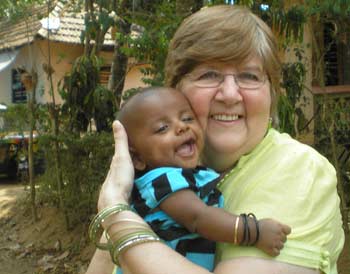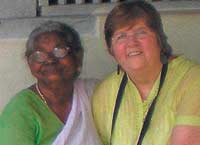Norfolk's Rev Pat is mother to untouchables
 To many people in and around the Diocese of Norwich, the Rev Canon Pat Atkinson MBE is a highly respected Anglican minister and recently retired hospital chaplain. But to hundreds of street children in India that she has helped to feed and educate during a 21-year ministry, she is simply ‘Patamma’ – meaning, ‘Pat Mother’. Rosemary Dawson reports.
To many people in and around the Diocese of Norwich, the Rev Canon Pat Atkinson MBE is a highly respected Anglican minister and recently retired hospital chaplain. But to hundreds of street children in India that she has helped to feed and educate during a 21-year ministry, she is simply ‘Patamma’ – meaning, ‘Pat Mother’. Rosemary Dawson reports.
“I’ve had a fascination for India since childhood,” Pat says. “My family weren’t churchgoers, but I had a big crush on the Anglican vicar who took us for Scripture lessons at school. So - at nine years old - I started going to church.
The first couple of weeks I went because of the vicar. But people befriended me and I was made to feel at home, so I stayed and gradually got involved.
“I was about 10 when a missionary from India spoke at the church. It just hit me between the eyes: I knew, from that moment onwards, what I was going to do with my life. I decided to train as a nurse so that I could do mission work.”
But then disaster struck. Pat became very ill with Stills Disease - a childhood version of rheumatoid arthritis - and was in hospital for four months. At one point her parents feared she would never walk again.
“No one wanted to accept me for training with my medical history, and I thought that was the end of a nursing career. Eventually I managed to get into the British Army to train as a State Enrolled Nurse. But six weeks before qualifying the illness flared up again, and I was medically discharged with a calliper on my leg. I had already applied to go to India with the Church Missionary Society, but that stopped too.
“The only other thing I could do was play the trumpet, so I got a job with a dance band in a holiday camp at Gorleston in Norfolk because they also wanted someone with medical experience. I was very cross with God, and anti-church for quite a while. The only good thing that happened to me was getting married!”
One day Pat read a library leaflet about the Deaconess Order, which was dedicated to working with the poor and sick. “I started training in 1977, and was eventually ordained a deacon and priest.
“I worked full-time as an unpaid hospital chaplain at the Norfolk and Norwich Hospital for seven years until the family needed more income, which meant I had to get a paid job. I already had a teaching qualification, and started training care workers at Norwich YMCA. In 1990 the General Secretary asked if anyone would like to go to India to visit our boys’ home – and of course, I jumped at the chance!”
That visit, which she had dreamed of for so many years, had an unexpected outcome. “I hated it - the overwhelming poverty, the smells - and couldn’t wait to get away. But then I saw the look of utter hopelessness and despair in the eyes of a young beggar boy living on a rubbish tip, and knew I had to do something for children like him. I just had an incredibly strong feeling that this was where I was supposed to be.
“The YMCA were about to close their boys’ home so I decided to take it over myself, initially with another colleague.

“Over a nine-year period I went out to India in eight-week blocks. I had to leave my YMCA job, and did all kinds of things to raise money - cleaning toilets, working in care homes, washing glasses, anything I could get. As news about my work with street children got around, the local hospital contacted me again about being a part-time paid chaplain. We negotiated special leave for when I needed to go to India.
“At first I spent hundreds of hours on the streets, just getting to know what life was really like for the people. I decided to concentrate on children’s work first, because education is really important; it gets them out of poverty and into jobs.
“Three generations have passed through our homes now. Fifty have gained degrees of various kinds; one has a Master’s degree, and another is about to finish theirs. Another has become a pastor. We have carpenters, electricians, mechanics, bank staff, textile designers, and machinists. A significant number of them also give voluntary help at our centres.”
The plight of India’s ‘untouchables’ – the lowest class of society – is very dear to Pat’s heart. “These women, many of whom have leprosy, scavenge on rubbish tips to survive when their families can’t afford to keep them. They are literally turned out onto the street.
“We did a year-long survey of people living on rubbish tips. The government estimate is 1500; we found at least that number in the first two-and-a-half hours! The tips are periodically destroyed, and dead bodies are sometimes found in the rubbish.
“We set up a feeding station near the tip, so that these people would at least get one good meal a day. The first group that came were so sick we couldn’t possibly let them go back – before we knew it, we had a home with 19 residents! Over the door of each centre we put the words that Jesus spoke from the cross when he committed Mary to the care of his disciple: ‘Behold your mother’ (John 19:27 New King James Version). I just can’t get those words out of my mind when I look at these women. That’s my motivation for this particular work.
“Eight years ago I set up the Vidiyal Charitable Trust in India and the UK. Its name means ‘new beginnings’. This allows us to buy land and build on it without fear of corruption, which is our worst enemy. Our centres are run by local people who I have known and worked with for many years, and our trustees are all from local Christian churches. We don’t spend money on publicity or waste our resources, 95 per cent of which is raised by Norfolk churches. Every penny raised goes to God’s work. I pay my own fare when I go out twice a year.”
The trust bought an acre of land at Mavelikara, which now houses a home for 22 boys, another for 19 girls, and a school. Around 126 children from the rural slums come every day for breakfast and tuition, and again after school for an evening meal and another two hours’ tuition. The criteria for attending is that the family income is less than £50 a year.
“Three miles away another feeding centre helps 52 people from the slums – who have no water, sanitation or electricity - every day.
“We rent a shack and one room in Madurai, which enables us to run a tuition and care centre for another 76 children. They come at 6am for breakfast, and again after school when they receive an evening meal in the form of nutritional supplements. When the children have gone, it’s the turn of the elderly. We have about 15 women who come at 10am, stay for lunch, and go home in the afternoon. They receive medical care and access to a doctor.
“We also have a training and development link with an Indian cancer centre in Kerala. We supply, equip and fund two ambulances for outreach clinics (held in church premises) for 300 people who can’t afford bus fares to hospital, and pain relief for around 60 terminal patients in their homes.
“Our newest project is a leprosy clinic, where blood tests determine who needs treatment. This is also showing up a great variety of other illnesses.”
The Vidiyal Trust also has projects in Sri Lanka. “After the 2004 tsunami I met a Catholic priest who had lost half of his congregation. The local school was destroyed, so we sponsor 45 children to help make up a year’s lost education. We also have two tuition centres for another 46 – one in a shack on the beach, the other in a city. We pay the priest a small allowance; he now works in a refugee camp without a salary,” said Pat.
“Our work in India is really a model of what is going on in the UK, where ‘community’ has become a bad name. We’ve got to go out here too, and give God’s love unconditionally,” explained Pat.
Pat - who was awarded the MBE for her work with street children in 2006 - has suffered dysentery, malaria, and endured dreadful living conditions during her ministry.
“There were several occasions when I thought I was going to die,” she admits. “But it’s been an incredible privilege to reach out to these people in God’s name. I get such amazing love back from the children and my old ladies, and that makes it all worthwhile.”
Article reprinted with permission from The War Cry.